About the Department
Vision & Mission
Vision of the Department
To educate the budding researcher with professional principle to meet the challenges in the field of biotechnology.
Mission of the Department
To onset a skilful research potential in emerging technological area like environmental, industrial, agricultural and health for the societal benefit.
Courses Offered
- B Sc., Biochemistry
- M.Sc., Biochemistry
- Ph.D. Biochemistry
The academic programmes are based on the choice based credit system as per UGC regulations. Each Programme comprises several core, elective courses, internships, field visit and project work.
Add on Course
The Department also offers a two year Diploma in Medical Lab Technology course (conducted by Bharat Seva Samaj) duly approved and certified by the Planning Commission, Government of India, assuring students with 100% Placement.
About Research Programmes
Ample opportunities are provided for research-minded students to work on their research skills and participate actively in pioneering research studies through Ph.D programme. The faculties along with their scholars do active research in frontier areas, which often results in highly acclaimed publications in International and National Journals and patents. Most of the research work is presented in International and National conferences.
Research Areas
- Biochemical, toxicological and pharmacological evaluation of the efficacy of plants, active constituents and plant based nano particles.
- Preclinical evaluation of bioactive constituents for disorders and diseases like cancer, ulcer, rheumatoid arthritis, diabetes.
- Biochemical and molecular characterization of microbial enzymes of industrial importance.
- Insights into the mechanism underlying neuro pathophysiology and its amelioration employing phytochemicals.
Corporate Partnership
The Department always intends to foster student and industry interaction for acquiring additional knowledge, technical knowhow and update of latest technologies among students. For this purpose the department has Memorandum of Understanding with corporate firms. These include the
- Stannis Institute of Paramedical Sciences for conducting 2 year DMLT course with lab practices.
- Greens Med Lab and Avanz Biotech for internship programs, biochemical estimations and sample Processing.
Placement
We have 100% job placement record. Students have no trouble finding coveted positions in reputed corporate companies that visit the campus every year, offering an excellent salary package on par with international standards. Candidates interested in career options other than clinical diagnostics shall also be assisted in pursuing their interests. Placements were obtained earlier from reputed corporates include Cipla, Alkem, Orchid, Pfizer, Ranbaxy, DRL etc.,
Faculty-Student Ratio: 1:20
Facilities
Labs and Classrooms:
Two separate dedicated Labs for UG and PG Biochemistry students.
5 Smart classrooms with WiFi facility.
| Instruments Available: |
|
|
|
|
|
|
|
|
|
|
|
|
|
|
|
|
|
|
|
|
|
|
|
|
Programme Outcomes
PROGRAM OUTCOME (PO)
PO1: Engineering knowledge: Apply the knowledge of mathematics, science, engineering fundamentals, and an engineering specialization to the solution of complex engineering problems.
PO2:Problem analysis: Identify, formulate, research literature, and analyze complex engineering problems reaching substantiated conclusions using first principles of mathematics, natural sciences, and engineering sciences.
PO3: Design/development of solutions: Design solutions for complex engineering problems and design system components or processes that meet the specified needs with appropriate consideration for the public health and safety, and the cultural, societal, and environmental considerations.
PO4: Conduct investigations of complex problems: Use research-based knowledge and research methods including design of experiments, analysis and interpretation of data, and synthesis of the information to provide valid conclusions.
PO5: Modern tool usage: Create, select, and apply appropriate techniques, resources, and modern engineering and IT tools including prediction and modeling to complex engineering activities with an understanding of the limitations.
PO6: The engineer and society: Apply reasoning informed by the contextual knowledge to assess societal, health, safety, legal and cultural issues and the consequent responsibilities relevant to the professional engineering practice.
PO7: Environment and sustainability: Understand the impact of the professional engineering solutions in societal and environmental contexts, and demonstrate the knowledge of, and need for sustainable development.
Program Educational Objectives (PEO)
PROGRAM EDUCATIONAL OBJECTIVES (PEO)
PEO-1: An ability to relate fundamental knowledge related to pure sciences in aninterdisciplinary manner for providing innovative ideas to solve problems having global impact.
PEO-2: An ability to critically analyze scientific data, draw objective conclusions and applythis knowledge for human welfare. Students should be able to demonstrate expertise and ethical perspectiveon areas related to Biochemistry.
PEO-3: After completion of the program the students are well poised to pursue careers in academic, research and industry in the areas of pharmaceutical and biotechnology.
PEO-4: Life-long learning to retain and build on scientific skills and use them to updateknowledge and apply them in day to day life.
PEO-5: Understanding and Disciplinary knowledge of biochemistry, structure, function of biological molecules and its mechanisms.
Programme Educational Objectives (PEOs)
PROGRAM EDUCATIONAL OBJECTIVES (PEOs)
The Programme Educational Objectives of the M.Sc. in Immunology & Microbiology
programme at VISTAS are given below and are numbered from PEO1 to PEO4.
PEO 1: To provide the candidates with in-depth knowledge in immunology and microbiology and a firm grasp of the processes that employ or deal with microbes plus adept use of immunological techniques in relevant technologies that empowers them to deal with the safe and efficient use and monitoring of microbiological and immunological applications with development of competence on par with global standards and helps in the life-long learning of candidates.
PEO 2: To enable candidates by imparting updated analytical and hands-on skills to use and implement technological developments related to advanced and potential areas involving molecular diagnostics, automated systems of diagnosis, immunoblotting technology, upstream or downstream processing and nanotechnology with scope for upskilling upto future technologies so as to contribute effectively for Research & Development leading to patenting and publishing.
PEO 3: To train candidates to choose a decent career option either as Entrepreneur or having a high degree of employability; or pursue research – by providing training in interpersonal skills, sense of social responsibility, ethical and administrative acumen, ability to handle critical situations allowing them to be good team members and leaders as well as training to excel in competitive examinations.
PEO 4: To impart a strong sense of social responsibility with awareness of professional and societal ethical values and scope to develop leadership capabilities with the continuous need for lifelong learning.
Program Outcomes (PO) & Program Specific Outcome (PSO)
PROGRAM OUTCOMES (PO)
PO-1: Scientific knowledge: Graduates will acquire biochemistry/biotechnology / bioinformatics/ microbiology specific knowledge, including recent techniques in the respective fields coupled with hands-on skills and leadership skills for a successful career.
PO-2: Problem analysis: Graduates will be able to analyse, solve and troubleshoot problems in implementation of biochemistry/biotechnology/ microbiological protocols.
PO-3: Design/development of solutions: Graduates will develop creative thinking and cooperate with each other to solve problems in the field of biochemistry/biotechnology/bioinformatics/ microbiology.
PO-4: Conduct investigations of complex problems: Graduates will acquire practical skills – which help in planning and designing protocols to validate hypothesis and execute experimental techniques independently as well as assimilate, analyse and interpret subsequent data.
PO-5: Modern tool usage and communication: Graduates will effectively be able to manage resources and time using ICT and computer enabled devices and accomplish ability to understand and communicate all ideas effectively.
PO-6: Environment sustainability and Ethics: Graduates will get adequate knowledge to use information and implement solutions for environmental protection and remediation. Graduates will be aware of their role and responsibility in handling and use of microbes including genetically modified microorganisms.
PO-7: Lifelong learning: Graduates will carry on to learn and adapt in a world of constantly evolving technology.
PROGRAM SPECIFIC OUTCOME (PSO)
PSO1: An ability to acquire in-depth theoretical and practical knowledge of Biochemistry and theability to apply the acquired knowledge to provide cost efficient solutions in Biochemistry.
PSO2: An ability to properly understand the technical aspects of existing technologies that help in addressing the biological and medical challenges faced by humankind.
PSO3: An ability to translate knowledge of Biochemistry to address environmental, intellectual, societal and ethical issues through case studies presented in the class.
Programme Outcomes (POs) & Programme Specific Outcomes(PSOs)
PROGRAM OUTCOME (PO)
PO1: Scientific knowledge: Graduates will acquire biochemistry/biotechnology / bioinformatics/ microbiology specific knowledge, including recent techniques in the respective fields coupled with hands-on skills and leadership skills for a successful career.
PO2: Problem analysis: Graduates will be able to analyse, solve and troubleshoot problems in implementation of biochemistry/biotechnology/ microbiological protocols.
PO3: Design/development of solutions: Graduates will develop creative thinking and cooperate with each other to solve problems in the field of biochemistry/biotechnology/bioinformatics/ microbiology.
PO4: Conduct investigations of complex problems: Graduates will acquire practical skills – which help in planning and designing protocols to validate hypothesis and execute experimental techniques independently as well as assimilate, analyse and interpret subsequent data.
PO5: Modern tool usage and communication: Graduates will effectively be able to manage resources and time using ICT and computer enabled devices and accomplish ability to understand and communicate all ideas effectively.
PO6: Environment sustainability and Ethics: Graduates will get adequate knowledge to use information and implement solutions for environmental protection and remediation. Graduates will be aware of their role and responsibility in handling and use of microbes including genetically modified microorganisms.
PO7: Lifelong learning: Graduates will carry on to learn and adapt in a world of constantly evolving technology.
PROGRAM SPECIFIC OUTCOME (PSO)
The overall outcome of graduates specific to M.Sc. in Immunology & Microbiology programme at VISTAS can be summarized as:
PSO 1: The ability to understand, implement and troubleshoot the concepts related to the fields of microbiology and immunology which will enable them to analyse and develop solutions to microbiology, immunology and rDNA related problems using knowledge and hands-on skills in microbiology, molecular identification, immunodiagnostics, screening for useful biomolecules and nanotechnology in the interpretation of data in relevant protocols.
PSO 2: The ability to gainfully become an entrepreneur by using microorganisms to mass produce biofertilizers, mushrooms or any other edible forms of SCP, fermented products and pharmaceutically important biomolecules as well as using knowledge, communication and practical hands-on training to become employed in diagnostic, industrial, pharmaceutical, food and research and development laboratories.
PSO 3: The ability to understand the principles and concepts underlying immunology and microbiology, including the interactions between microorganisms and the immune system and to Possess proficient laboratory skills in techniques relevant to immunology and microbiology, including culturing microorganisms, performing immunological assays, and molecular biology techniques such as PCR and sequencing etc.,
PSO 4: The ability to critically analyze the research in Immunology and Microbiology and to evaluate experimental design, methodology and interpretation of results and to understand the regulation of immune responses which includes the roles of different immune cells, cytokines and signaling pathways in health and disease.
PSO 5: For the effective scientific communication and to relate microbes and their role in ecosystem and public health research with wide opportunities and career prospects.
Curriculum & Syllabus
CURRICULUM & SYLLABUS
MINIMUM CREDITS TO BE EARNED: 140
| Category | Course | Hours/Week | Credits | Maximum Marks | ||||
|---|---|---|---|---|---|---|---|---|
| Lecture | Tutorial | Practical | CA | SEE | Total | |||
| LANG | Tamil I/ Hindi / French | 5 | 0 | 0 | 5 | 40 | 60 | 100 |
| ENG | English I | 5 | 0 | 0 | 5 | 40 | 60 | 100 |
| CORE | Algebra & Trigonometry | 4 | 0 | 0 | 4 | 40 | 60 | 100 |
| CORE | Differential Calculus | 4 | 0 | 0 | 4 | 40 | 60 | 100 |
| CORE | Physics | 4 | 0 | 0 | 0 | 40 | 60 | 100 |
| CORE | Physics Practical | 0 | 0 | 2 | 1 | 40 | 60 | 100 |
| Total | 22 | 0 | 0 | 23 |
Curriculum & Syllabus
CURRICULUM & SYLLABUS
MINIMUM CREDITS TO BE EARNED: 140
| Hours/Week | Maximum Marks | |||||||
|---|---|---|---|---|---|---|---|---|
| Code No. | Course | Lecture | Tutorial | Practical | Credits | CA | SEE | Total |
| SEMESTER 1 | ||||||||
| LANG | Tamil I/ Hindi / French | 3 | 0 | 0 | 3 | 40 | 60 | 100 |
| ENG | English I | 3 | 0 | 0 | 3 | 40 | 60 | 100 |
| CORE1 | Biomolecule I | 3 | 1 | 0 | 4 | 40 | 60 | 100 |
| CORE2 | Basics of Nutrition | 3 | 1 | 0 | 4 | 40 | 60 | 100 |
| CORE3 | Human Physiology | 4 | 0 | 0 | 4 | 40 | 60 | 100 |
| CORE | PRACTICAL1 - Qualitative analysis of Biomolecules | 0 | 0 | 4 | 2 | 40 | 60 | 100 |
| CORE | PRACTICAL 2- Nutritional Biochemistry | 0 | 0 | 4 | 2 | 40 | 60 | 100 |
| AECC | Communication Skills | 1 | 0 | 2 | 2 | 40 | 60 | 100 |
| SEC | Orientation/Inducton programme / Life skills | - | - | - | - | - | - | - |
| Total | 17 | 2 | 10 | 24 |
Curriculum & Syllabus
CURRICULUM & SYLLABUS
MINIMUM CREDITS TO BE EARNED: 90
| Hours/Week | Maximum Marks | |||||||
|---|---|---|---|---|---|---|---|---|
| Code No. | Course | Lecture | Tutorial | Practical | Credits | CA | SEE | Total |
| SEMESTER 1 | ||||||||
| Core | Core 1 – Chemistry of Biomolecules | 4 | 0 | 0 | 4 | 40 | 60 | 100 |
| Core | Core 2- Advanced Instrumental techniques | 4 | 0 | 0 | 4 | 40 | 60 | 100 |
| Core | Core 3 – Cellular Biochemistry | 3 | 0 | 2 | 4 | 40 | 60 | 100 |
| Core | Core 4 – Biochemistry & Instrumentation | 0 | 0 | 4 | 2 | 40 | 60 | 100 |
| DSE | DSE 1 | 4 | 0 | 0 | 4 | 40 | 60 | 100 |
| DSE | DSE 2 | 4 | 0 | 0 | 4 | 40 | 60 | 100 |
| SEC | Soft Skill 1/ Sector Skill Course | 2 | 0 | 0 | 2 | 40 | 60 | 100 |
| Total | 21 | 0 | 6 | 24 |
Eligibility Criteria
| Program | Eligibility | Criteria for Merit |
|---|---|---|
| B.Sc. Mathematics | Pass in +2, HSC or equivalent with Biology / Maths / Physics / Chemistry | Merit based on percentage of marks secured in the qualifying examination. |
Eligibility Criteria
| Program | Program Duration (Year) | Eligibility | Criteria for Merit |
|---|---|---|---|
| B.Sc Bio Chemistry | 3 Years (6 Semesters) | Pass in +2, HSC or equivalent with Biology / Maths / Botany, Zoology / Physics / Chemistry / Nutrition & Dietetics, Microbiology, Biochemistry | Merit based on the percentage of marks secured in the qualifying examination |
Eligibility Criteria
| Program | Program Duration (Year) | Eligibility | Criteria for Merit |
|---|---|---|---|
| M.Sc Biochemistry | 2 Years (4 Semesters) | Degree in Zoology, Botany, Biochemistry, Chemistry, Microbiology, Genetics, Biotechnology, Agriculture, Bio informatics, Nutrition & Dietetics and Life Sciences, BVSc., (10+2+3 pattern) | Merit based on the percentage of marks secured in the qualifying examination |
Career Prospects
CAREER PROSPECTS
- Data Analyst
- Machine Learning Engineer
- Operational Researcher
- Financial/Investment Analyst
- Research Assistant/Scientist
- General Management
- Actuarial Science
- Accountancy and Professional Service
Career Prospects
CAREER PROSPECTS
- Academic Researcher
- Analytical Chemist
- Biomedical Scientist
- Biotechnologist
- Clinical Research Associate
- Clinical Scientist, Biochemistry
- Forensic Scientist
- Nanotechnologist
- Pharmacologist
- Physician Associate
- Research Scientist (Life Science)
- Scientific Laboratory Technician
- Health and Safety Inspector
- Medical Science Liaison
- Neuroscientist
- Patent Examiner
- Science writer
- Toxicologist
Career Prospects
CAREER PROSPECTS
- Forensic scientist
- Research analyst
- Medical coder
- Food safety analyst
- Food inspector
- Medical Representative
- Quality control in R & D of pharma and biotech companies.
Alumni Testimonials

My studies of Mathematics (BSc) at VISTAS, in 2021 played a key role in shaping my career. Thanks to the amazing faculties, curriculum and learning resources available, my problem-solving and critical thinking skills improved tremendously during the course, as my passion for the subject grew. Now I am working in Programmer Trainee, Cognizant Technology solutions Pvt lmt, Chennai. It was indeed a privilege for me to be part of the mathematics department.
R. NIVETHA (B.Sc., Mathematics), 2017-2020
Programmer Trainee, Cognizant Technology solutions Pvt lmt

My experiences as an undergraduate, a graduate student of the Department of Mathematics in VISTAS, prepared me well for a fulfilling and rewarding career. The level of dedication and support from the faculty in and out of the classroom was remarkable, and worth commending. The diverse nature of assignments and co-curricular activities, including science exhibitions, enriched my learning experience as they developed my skills and ability to innovatively apply mathematics in the real world.
M. GETSIYAL (B.Sc., Mathematics), 2017-2020
SUTHERLAND Global Service, NA Process

I am currently working at SPI GLOBAL, Text coder and paginator in the Effectiveness office. I obtained this position shortly after graduating B.Sc., Mathematics from VISTAS, in 2020. Majoring in math gave me the analytical, statistical, and programming skills I needed to land this position. The numerous opportunities for soft skill development designed in the courses have helped me in my career growth.
P. HARIHARAN (B.Sc., Mathematics), 2017-2020
SPI GLOBAL, Text coder and paginator

The Department of Mathematics has offered me a plethora of opportunities to develop and mould my personality as an individual. It has great infrastructure, facilities and very knowledgeable faculty members. The everyday activities keep everyone motivated and busy with their work, one can enjoy as well as learn a lot of things at the same time in VISTAS. Our University gives its students enough opportunities to showcase their creativity, their talent in every way possible. The cultural programs are very enjoyable.
P. ROHINI (B.Sc., Mathematics), 2017-2020
CASAGRAND, CRM Execute
Alumni Testimonials

I enjoyed my course well during my bachelors. The faculty members and the department is really supportive towards our studies. The environment in the university is friendly and stress-free. The curriculum in our department was framed in a better way thereby gave a great insight towards the course and research. People interested in extra-curricular activities were also supported by the department to go attend their events. The national conferences held every year gave us idea towards the recent development in the field of biochemistry and it was a great exposure. Overall my experience in the department and the campus was helpful in building my career.
Ms. Janani. A (B.Sc. Biochemistry), 2017-2020
Doing my masters in biochemistry from Crescent University in Chennai at present (2020-2022).

I AM A PROUD WOMEN ENTREPRENER.
It gives me great pleasure to say with pride that I have completed my B.Sc. (bio chemistry) in Vels university. My memories in Vels university are mostly magical, for it has helped as a building block for my career. My extra disciplinary course entrepreneurial development paved a way to become an entrepreneur. All the faculties were very supportive and because of them I managed to secure a good percentage in my academics. My time at VELS UNIVERSITY has provided me an academically stimulating environment with topnotch facilities and infrastructure. Highly qualified and enthusiastic faculties played a vital role in shaping up my career. The vast opportunities and the competitive environment have always helped to bring the best out of me. I am happy and grateful to have done my bachelors in VELS UNIVERSITY. My sincere gratitude to my staffs, lab assistants and the Management.
Ms. PAVITHRAA ELUMALAI (B.Sc Biochemistry), 2014-2017
ENTREPRENER

The journey during my bachelor’s has always been focused on the path to college and success by securing the first rank and receiving the gold medal.I began to recognize my potential and ability to enhance reading and writing skills while becoming critical of my educational goals.Upon graduating from Vels, I transferred to the University of Madras, Chennai,to pursue a master’s degree in Library and Information Sciences. After my postgraduation, I have worked in various positions at Tata Consultancy Services (TCS), Chennai, and the Indian Institute of Information Technology, Design and Manufacturing, Kancheepuram. Now, I am working at the Central Library, Central University of Tamil Nadu, Thiruvarur, as permanent staff (Central Government Employee) providing Library and Information services and research support to the students, scholars, and faculty.
Reflecting on my educational journey, from Velsto now, I can appreciate how it has shaped the resilient and persistent person I am today. I have accomplished many incredible things that have enriched my academic experience and influenced my educational and professional aspirations. The Library atVels University was instrumental in changing my career as I developed a great interest in visiting the Library frequently for reading, which cultivated a passion in me to work in Libraries.
Mr. SanmatiJinendran Jain (B.Sc. Biochemistry), 2013-2016
Professional Assistant (Library) at the Central University of Tamil Nadu

My experience at VISTAS was great and memorable for lifetime. I always thankful to all faculties, Mentors and entire Biochemistry department at VISTAS to enhance my academic and interpersonal skills. The best thing about VISTAS is the cross- culture interaction between students from various parts of the world. As one among the placement coordinator, I was grateful to Training and Placement cell for providing a platform to enhance my leadership, time management, team work and an opportunity to showcase them. While pursuing my PG course, I could find a lot of benefits that what I have learned at VISTAS. The excellence of faculty, strength of infrastructure and faculties, commitment to education stepping up day by day. The regularly held seminars, presentations and conferences have led us to be exposed to the upcoming trends. I have emerged as a new individual. All thanks to my “VISTAS”.
Mr. SASIKUMAR G (B.Sc. Biochemistry), 2017-2020
pursuing Master of Science in Advanced Biochemistry from University of Madras.

My days during Bachelors were Amazing. My experience at VELS was full of learning and grooming. As VELS gives a friendly campus environment. I enjoyed a lot during those days with studies VELS encourages students to involve in extracurricular events as well. The study curriculum was good which helped me a lot I learnt many things while doing my bachelors. Infrastructure of VELS is good and well for students. Overall academics is well in VELS. Faculties were best with friendly nature and gave their total potential in teaching and clearing concepts. The mentors at VELS helped us enhance my academic and interpersonal skills. The entire faculty and department leave no stone unturned to shape one’s future. My three years at VELS have been a wonderful experience of learning with prolific exposure to outside. Huge respect, love and devotion for entire faculty members and department. It’s their efforts that make me to count myself into better professionals. It was a great experience. Regular interaction with my mentors made me to develop skills which would help me in future. VELS helped me to do better in academically, and even in extracurricular activities, VELS helped me to prepare for a challenging world. I have learned, gained knowledge and enjoyed a lot in this institution.
Mr. MARIKAR MOHAMMED SHAFIQUE (B.Sc. Biochemistry), 2017-2020
pursuing Master of Science in Biochemistry & Molecular biology from Crescent university

My journey during Bachelors was great. Being a student from other state, I didn’t feel any sense of uneasiness in the campus. I could find the curriculum was set well. When going through question papers of various entrance examinations, I could find the benefits. Vels has also helped me find out the true potential in me. Faculties has helped me a lot. At every step, I have been fortunate to interact with some very different and motivated set of minds. I have been also part of cultural, and hence could enjoy that sector too and had the opportunity to host various events. As a social being, I could be a part of the Rotaract Club of our college and work for it. VISTAS helped me to do better academically, socially, in extracurricular activities, what to be and what not to be to prepare me for a new world. I have learned and gained many things from this institution.
Ms. Sreelakshmi Sivadasan (B.Sc. Biochemistry), 2017-2020
pursuing Master of Science in Biochemistry fromCentral University of Kerala
Alumni Testimonials

Currently working in Aarthi scans and Labs @ Vadapalani, Chennai.
It was a great experience studying at Vels University, a memory to cherish for lifetime. My experience at Vels was full of learning and grooming. Being a great university, it gave me an opportunity to meet different kind of people from around the world and learnt many things from them. I am thankful to all the faculties, mentors and entire Biochemistry department for providing us with quality education. I am also grateful to faculties for organizing online classes in this pandemic situation and helping me for effective learning. Overall, it was a great experience and lifetime memory at VISTAS. If you want to make a career in Master degree would highly recommend you to join VISTAS.
Ms. S. Azeeza Sadaf. (MSc Biochemistry), 2019-2021
School of Life Sciences
Fee Structure
| Tuition Fee per year | Administration Fee | Registration Fee | Misc. (Per Sem) | Skill Enhancement Fee (Per Year) | Exam Fee (Per Sem) | At the time of admission | Even Sem | Odd Sem |
|---|---|---|---|---|---|---|---|---|
| 30,000 | 6,800 | 3,300 | 300 | 5,000 | 3100 | 33,500 | 18,400 | 23,400 |
Fee Structure
| Tuition Fee 2024 - 2025 (Per Sem) | Other Fee (Per Sem) | Total Fee 2024 - 2025 (Per Sem) |
|---|---|---|
| 15,000 | 13,000 | 28,000 |
Fee Structure
| Tuition Fee 2023 - 2024 (Per Sem) | Other Fee (Per Sem) | Total Fee 2024 - 2025 (Per Sem) |
|---|---|---|
| 25,000 | 20,000 | 45,000 |
Faculty of the Department
| Sl. No. | Name of the Faculty | Designation | Educational Qualification | Area of Specialization | Experience in Years | Vidwan ID | Photos |
|---|---|---|---|---|---|---|---|
| 1 | Dr.Usharani.B | Associate Professor and HOD | M.Sc., M.Phil, Ph.D | Diabetes, Cancer Biology | 19 years 2 months | 232684 | 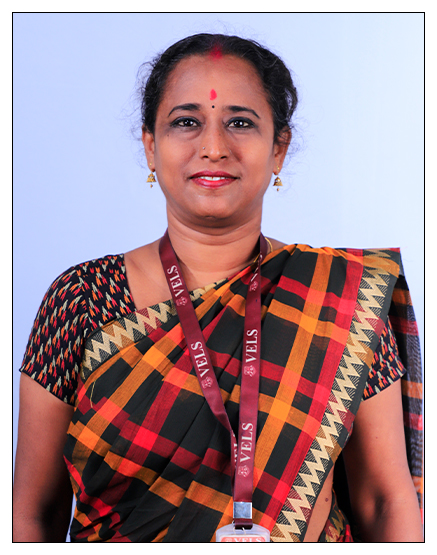 |
| 2 | Dr.Padmini.R | Associate Professor | M.Sc., M.Phil., Ph.D. | Cancer Biology, Nanoscience, pharmacology | 12 years 3 months | 232529 | 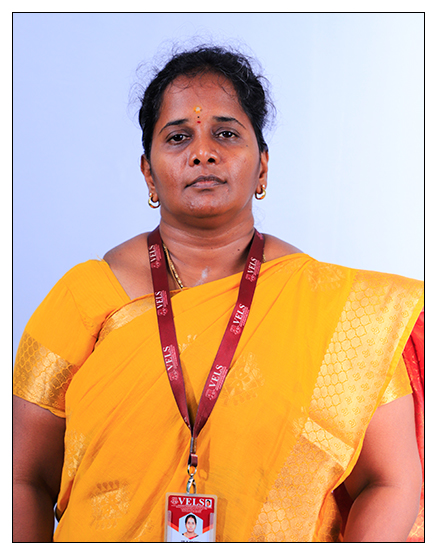 |
| 3 | Dr.C.Shobana | Associate Professor | M.Sc., Ph.D | Neuroscience, Parkinson’s disease, Alzhiemer’s disease, Cardiovascular diseases. | 12 years 1 month | 232492 | 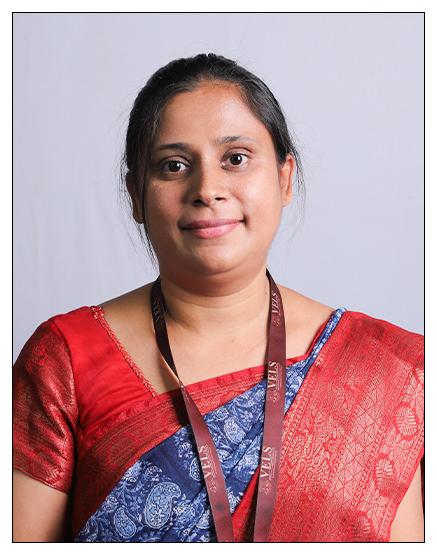 |
| 4 | Dr.Vidya.R | Assistant Professor | M.Sc., M.Phil, Ph.D | Phytotherapeutics, Nanobiotechnology, Clinical Biochemistry and Cancer biology | 9 years 8 months | 250258 | 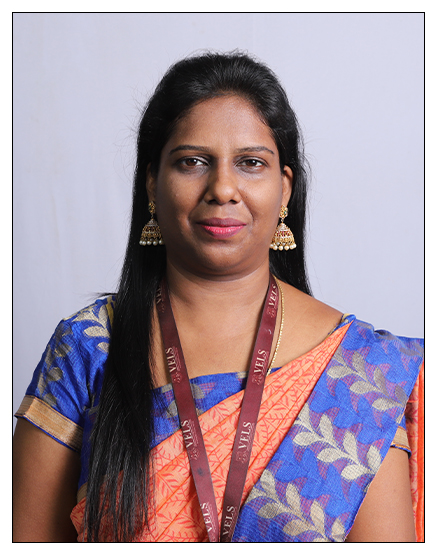 |
| 5 | Dr.Amudha.P | Assistant Professor | M.Sc., M.Phil, Ph.D | Seagrass, Phytochemicals, Nanotechnology & Cancer Biology | 9 years 1 month | 173368 | 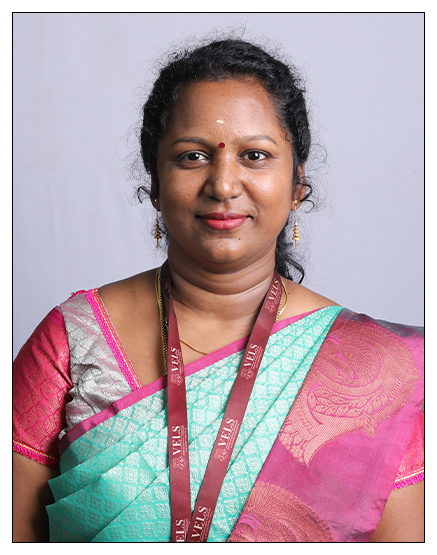 |
| 6 | Dr.Rohini.D | Assistant Professor | M.Sc.,M.Phil,Ph.D | Neurodegenerative diseases, Obesity, Rheumatoid Arthritis | 2 years 8 months | 367575 | 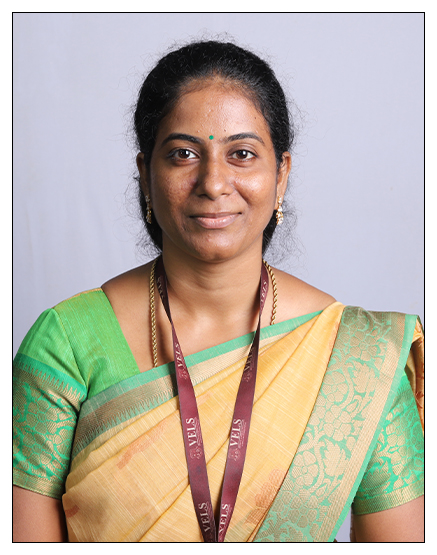 |
Faculty of the Department
| Sl. No. | Name of the Faculty | Designation | Educational Qualification | Area of Specialization | Experience in Years | Vidwan ID | Photos |
|---|---|---|---|---|---|---|---|
| 1 | Dr.Usharani.B | Associate Professor and HOD | M.Sc., M.Phil, Ph.D | Diabetes, Cancer Biology | 19 years 2 months | 232684 |  |
| 2 | Dr.Padmini.R | Associate Professor | M.Sc., M.Phil., Ph.D. | Cancer Biology, Nanoscience, pharmacology | 12 years 3 months | 232529 |  |
| 3 | Dr.C.Shobana | Associate Professor | M.Sc., Ph.D | Neuroscience, Parkinson’s disease, Alzhiemer’s disease, Cardiovascular diseases. | 12 years 1 month | 232492 |  |
| 4 | Dr.Vidya.R | Assistant Professor | M.Sc., M.Phil, Ph.D | Phytotherapeutics, Nanobiotechnology, Clinical Biochemistry and Cancer biology | 9 years 8 months | 250258 |  |
| 5 | Dr.Amudha.P | Assistant Professor | M.Sc., M.Phil, Ph.D | Seagrass, Phytochemicals, Nanotechnology & Cancer Biology | 9 years 1 month | 173368 |  |
| 6 | Dr.Rohini.D | Assistant Professor | M.Sc.,M.Phil,Ph.D | Neurodegenerative diseases, Obesity, Rheumatoid Arthritis | 2 years 8 months | 367575 |  |
 CHAT WITH A STUDENT
CHAT WITH A STUDENT